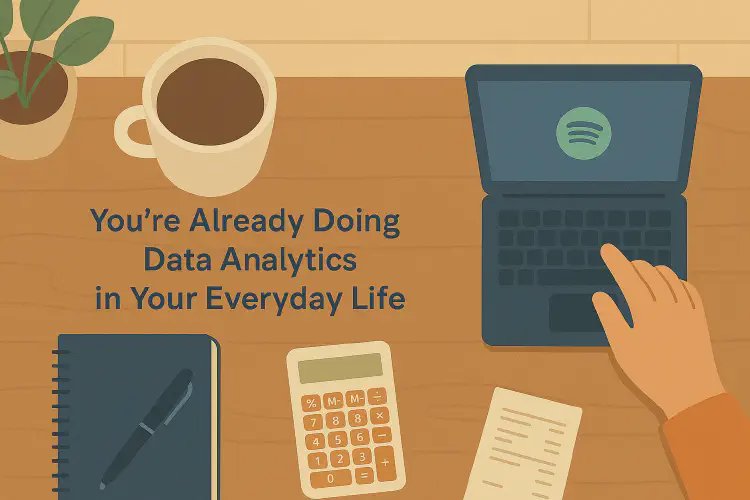You’re Already Doing Data Analytics in your Everyday Life. You Just Don’t Know it Yet
Have you ever realized you already analyze data in your daily life? Recognizing it might be the first step toward a career in data.
- | 5 min read

When people talk about data analytics, it often sounds like something far removed from everyday life, a world reserved for tech experts filled with dashboards, metrics, and endless spreadsheets. But the truth is, data isn’t distant or locked away in offices. On the contrary, it quietly influences the small decisions we make all the time.
From checking your bank balance to choosing what to buy while shopping, numbers guide your choices more than you realize. You’re already analyzing data, just without calling it that.
Let’s dive in and explore how data analytics shows up in your daily life, and how recognizing it might be the first step toward your future in data.
The everyday analyst in you
Think about the last time you checked your bank app before buying something. You probably glanced at your balance, considered the money coming in this month and the expenses going out, and then decided whether that new pair of shoes should wait until next month. That’s data analysis.
You gathered data (your account balance), analyzed it (compared it to your expenses), and made a data-driven decision (to buy or not to buy). You didn’t need a dashboard or a predictive model, just logic, context, and information. That’s the essence of analytics: using available data to make smarter choices.
Fitness apps: your personal dashboards
The bank account example is one that almost everyone relates to. But another area where data quietly guides our decisions is fitness.
If you’ve ever checked how many steps you walked in a day or how many hours you slept, you’ve already run your own performance report. You’ve likely noticed patterns too: your step count drops on weekends, or you sleep less on Monday nights.
That information helps you adjust your habits to reach your goals, maybe you walk an extra block on weekends or go to bed earlier at the start of the week.
That’s exactly what analysts do in companies: they identify patterns and suggest improvements. The only difference is scale: they do it for millions of users; you do it for yourself.
Spotify and Netflix: data-driven taste
Have you ever wondered how Spotify or Netflix always seem to know what you want next? These platforms are constantly analyzing your behavior, what you listen to, when you skip a song, how often you replay an artist.
But there’s another layer most people miss: you’re analyzing, too.
You notice that certain playlists help you focus, or that you skip the same type of songs halfway through. Maybe you’ve found that you tend to rewatch certain kinds of shows, or that you start a new one only if the trailer matches what you’ve liked before.
Without realizing it, you’re looking at patterns in your own behavior, which is exactly what analysts do on a larger scale. The difference is that analysts use aggregated data from millions of users to understand what keeps people engaged, improve recommendations, or predict what content will perform best.
So when you catch yourself choosing based on past experience, skipping, replaying, or selecting with intention, that’s you analyzing your own data, just intuitively.
The hidden side of everyday choices
Data isn’t limited to numbers on a screen. It’s simply information, and information is everywhere.
When you plan a trip, you compare flight prices, check reviews, look at weather forecasts, and weigh hotel proximity against cost. You gather data from multiple sources, filter out unreliable points (like that one suspicious review), and make an informed decision.
Even something as simple as grocery shopping involves data thinking. You compare prices, read nutrition labels, check expiration dates, and mentally track your spending. You might not realize it, but you’re creating your own little cost–benefit model in your head, which is one of the most fundamental forms of data-driven decision-making.
The myth of “being bad with data”
If we use data in many of our daily lives activities, then why do so many people still say, “I’m not good with data”?
Usually because they equate “data” with “math.” But analytics isn’t just about numbers — it’s about reasoning, observation, and curiosity.
Whenever you ask yourself, “Why did this happen?” or “What can I do differently next time?” you’re already thinking analytically. The tools can be learned later. The mindset? You already have it.
From daily logic to data career
Here’s the exciting part: if you recognize these patterns in yourself and have an interest in them, you already have a foundation to build a career in data analytics. Analysts don’t just crunch numbers, they interpret behavior, find patterns, and tell stories with data.
So next time you catch yourself making a small, thoughtful decision: comparing, adjusting, predicting, pause for a second, and remember that’s your analytical brain at work.
And if you ever decide to explore data analytics professionally, remember this: you’re not starting from zero. You’ve been analyzing data all along, just in your own way.
Start your Data Career with Linero Tech
If you’re curious about turning this everyday logic into a skillset, Linero Tech is here to guide you. You already collect and interpret data in a simple way, now, let’s take it to the next step.
At Linero Tech, we’ll help you build the foundation and give you the tools to thrive. Our Data Analyst programme is designed for beginners with no prior coding experience. We teach you everything you need to break into the job market, including:
- Python and Pandas for data processing
- SQL for querying databases
- Visualization with Python using Matplotlib and Plotly
Ready to become a data analyst; even if you’ve never written a line of code?
👉 Discover our tech training programs
👉 See student reviews and success stories
